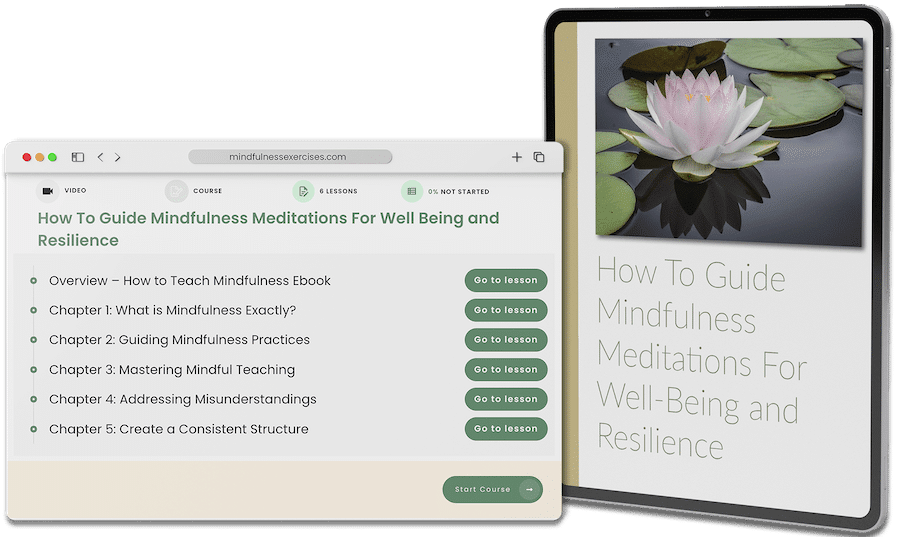Many therapists are now weaving mindfulness into the work they do with clients. Since mindfulness is simply the practice of paying non-judgmental attention to the present moment, it goes hand-in-hand with therapy. This type of practice can improve and nourish the relationship one has to whatever they are experiencing.
Yet while many therapists are interested in using mindfulness in their work, the ‘how’ is not always so clear. Mindfulness scripts for therapists are one type of resource that can facilitate your ability to share this technique with your clients. But why should you consider them and how can they work for you?

The Benefits of Mindfulness
As scientific research in the field of mindfulness and meditation grows, the clinical benefits of this practice are becoming clearer. Though mindfulness is indeed an ancient technique, it has many modern day applications. Some of the benefits of mindfulness practice that might correlate with the goals of therapists include:
- Reduced rumination
- Reduced stress
- Decreased emotional reactivity
- Improved flexibility in cognition
- Reduced anxiety
- Improved self-worth
While these are worthy benefits on their own, mindfulness when used by therapists also benefits the therapist individually. Recent studies have revealed how meditation and mindfulness practice impacts healthcare workers, counsellors and therapists included. Some of the findings suggest that:
- Mindfulness can reduce empathic person distress in counselors and psychotherapists
- Mindfulness can also improve perspective taking in counselors and psychotherapists
- Mindfulness interventions may help therapists to be more attentive during sessions and more comfortable in silence
So, mindfulness scripts can benefit therapists both personally and professionally. And, if a therapist is exploring their own capacity to be present to their inner world, they enhance their ability to bear witness to another’s. Using mindfulness in therapy thus has the potential to be mutually-enhancing.

How Mindfulness Scripts for Therapists Work
There are different ways that a trained professional can use mindfulness in therapy. The methods you choose will depend upon the type of therapy you work with and on your client. For example, a massage therapist might use mindfulness to help their client settle in at the beginning of a session. On the other hand, a psychotherapist might use the principles of mindfulness to help the person they are working with establish a new relationship to their inner world.
Use your intuition to determine the best way to weave mindfulness into your own practice. For some ideas of how mindfulness scripts for therapists can work, consider the following implementations:
Record meditations that your clients can use in-between sessions.
One great way to use mindfulness scripts is as material for recording meditations that clients can use on their own time. Many people need support beyond scheduled sessions with a therapist. So, if your client is interested in practicing on their own time, offer them a mindfulness meditation that will be supportive for them.
If you are offering resources like this for your client to use in-between sessions, ensure that they are ready to practice on their own. Depending upon where your client is at present, you might want to keep mindful exploration within the safe set-up of your sessions. Use your professional expertise to determine what will be most helpful.
Record a mindfulness script for upload on your website to meaningfully connect with potential clients.
Furthermore, we all like to get a feel for someone’s energy before we commit to ongoing work with them. One way to help potential clients gain a sense of who you are is to record short meditations and upload them to social media or to your website. This will offer those who don’t know you a better sense of your approach.
When recording mindfulness scripts to post online, you have a range of options. For example, you could share mindfulness of breathing, self-compassion, stress reduction, or any other mindfulness topic that relates to your work. You can also choose from a variety of lengths. For social media, consider ‘mini meditations’ – short recordings of three or four minutes to help people get grounded and find out who you are.
Lead a guided meditation during a session if the client is open and ready for it.
Depending upon your therapeutic modality, it might be appropriate to lead a complete guided meditation during a client session. For instance, you might start with a 10-minute grounding meditation to help your client settle in. Or, you might use a meditation script for self-compassion when difficult emotions arise.
You can also read through mindfulness scripts beforehand to gain a sense of how you might work with different challenges that arise. Then, in the midst of a session, you might simply call upon the techniques you learned about earlier.
Weave mindfulness together with the therapeutic modality you are trained in during a workshop or retreat.
You can also consider branching outside of traditional one-to-one sessions if this is permitted by your certifying body. In fact, ensure that any new implementations you make are accepted by the body that certifies you.
If it is appropriate for your type of therapy, you could plan a workshop or retreat that blends your understanding of both mindfulness and other therapeutic techniques. This could be something you lead on your own or with another therapist depending upon your expertise level and the size of the group.
Teach mindfulness meditation as a second offering.
If you fall in love with mindfulness, you might also consider becoming a certified mindfulness meditation teacher. This would diversify the ways that you can help others. Some of your existing clients might also be interested in private or group mindfulness sessions; or, you might attract new people to your work. You might even offer blended sessions.
Learn more about how to certify to teach mindfulness meditation.

5 Tips for Using Mindfulness Scripts
Reading mindfulness scripts is somewhat straightforward, and yet there are certain considerations worth making. When using mindfulness scripts as a therapist, consider the following five tips to enhance the safety and efficacy of your sessions:
Read through your chosen script numerous times before leading a client.
To ensure that the meditation you lead is both effective and safe for your client, familiarize yourself with the script you have chosen. Reading through it numerous times will help you to develop a natural pace and tone. You could even record it and practice it yourself to get a sense for what adjustments you might wish to make.
Make adjustments to mindfulness scripts to reflect the needs of your client.
Scripts are an excellent way to share mindfulness with others, but it is important to remember that you are allowed to go off-script. In fact, it is encouraged if going off-script will be helpful for your client. For instance, if leading new meditators, you might shorten the length of pauses. Or, you might tailor the words that you use depending upon how you typically speak with your client.
Be aware that mindfulness can sometimes cause trauma to resurface.
While mindfulness practice is supportive for many, it can also cause re-traumatization in some people. Therefore, it is essential that you learn more about how to practice trauma-sensitive mindfulness. Above all, the work we do with clients should do no harm.
Develop your own mindfulness practice.
To offer mindfulness in a more effective, credible, and authentic way, you should be working on developing your own mindfulness practice. Ask yourself: Do I practice the techniques that I am offering to others? You do not have to be an expert, but you should know the ins and outs of the techniques you are sharing.
Remain attuned to your client during the mindfulness practice.
Lastly, while you are leading a client through a mindfulness practice, you should remain attuned to how they appear to be receiving it. For instance, if you notice any signs of trauma coming up, it is imperative that you intervene warmly and professionally. One best practice is to start with short, simple sessions and build from there as you gain a sense of how it is received by a particular individual.

6 Mindfulness Scripts for Therapists
There is no shortage of mindfulness techniques and scripts to choose from as a therapist. Each situation will call for something unique, so consider equipping yourself with a variety of scripts that you can turn to when it is appropriate to do so. Consider the following six scripts as a place to start:
Alleviate Stress With Three Deep Breaths
You might begin your mindfulness work by introducing your client to the power of the breath. This could be used as a way to help your client settle in at the beginning of a session or as a technique for reducing overwhelm from stress.
Reflecting On Self-Compassion
Another valuable practice to offer your clients is self-compassion. Self-compassion is fundamental to a healthy, kind, and warm relationship with oneself. Consider this mindfulness script to help your clients develop a new way of relating to themselves.
Soft Belly
Breathing into the belly is a great technique to reduce stress and increase relaxation. You might consider this script to help your clients relax at the beginning of a session. If using this technique, keep in mind that not everyone can easily breathe into their stomach. Let each client breathe as deep as is comfortable for them.
Noting Your Judgments
The judgments we make on a daily basis can hinder our sense of well-being. This script can help your clients to become more aware of the thoughts they experience and to tune into the peace that lives behind those thoughts.
Body Scan, Advanced
Another commonly used mindfulness technique is the body scan. Body scans can enhance self-awareness and the relationship between mind and body. This type of script may be beneficial for therapists that work to attune the physical body.
Notice and Accept Your Body in the Present Moment
Lastly, this mindfulness script is an alternative approach to the standard body scan practice. It is designed to enhance self-acceptance and may be very useful for some clients.
Instantly download 200 guided meditation scripts
As you explore the intersection of mindfulness and therapy, make sure that you are practicing mindfulness yourself. The best way to understand how mindfulness can support human wellbeing is to experience it for oneself. So, invite mindfulness into your own life and notice how your intuitive understanding of how to support your clients grows.
References:
- 1 Davis, D., & Hayes, J. (2002). What are the benefits of mindfulness?. Retrieved 16 April 2021, from https://www.apa.org/monitor/2012/07-08/ce-corner
- 2 Cho, J. (2016). 6 Scientifically Proven Benefits Of Mindfulness And Meditation. Retrieved 16 April 2021, from https://www.forbes.com/sites/jeenacho/2016/07/14/10-scientifically-proven-benefits-of-mindfulness-and-meditation/?sh=1b43a8463cee
- 3Cooper, D., Yap, K., O’Brien, M. et al. Mindfulness and Empathy Among Counseling and Psychotherapy Professionals: A Systematic Review and Meta-analysis. Mindfulness 11, 2243–2257 (2020). https://doi.org/10.1007/s12671-020-01425-3
- 4Christopher, John & Maris, Judy. (2010). Integrating mindfulness as self-care into counseling and psychotherapy training. Counselling and Psychotherapy Research. 10. 114-125. 10.1080/14733141003750285.


















